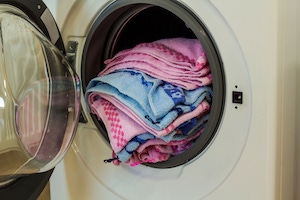Will import tariffs on washing machines help or hurt the United States?
The 20% tariff applies to the first 1.2 million large residential washing machines imported in the first year; additional imports will face a 50% tax.
January 23, 2018

The Trump Administration imposed tariffs on imported washing machines and solar panels yesterday after determining that cheap imports from South Korea (washing machines) and China (solar panels) were hurting America’s market. The imposed tariffs of up to 20% for solar panels and up to 50% for washing machines resulted in stock prices rising for major appliance maker Whirlpool, which rose 5% on Tuesday (Jan. 23), and Arizona-based First Solar, which gained 4%.
The 20% tariff applies to the first 1.2 million large residential washing machines imported in the first year; additional imports will face a 50% tax. This hits appliance makers Samsung and LG, specifically, after a complaint was filed by Whirlpool.
Samsung announced plans back in June 2017 to build a washing machine plant in Newberry, SC, perhaps in response to the possibility of the Trump administration imposing tariffs on imports. However, Samsung is not a new manufacturer in the United States. The announcement about the new plant in South Carolina came on the heels of a series of investments in the United States totaling more than $10 billion. As an article in PlasticsToday noted in June, over the past nearly two years, Samsung has:
“acquired Connecticut-based Harman International for $8 billion that positions the company to be a leader in the connected car market;
committed $1.2 billion to U.S.-based Internet of Things R&D and investments over the next four years;
committed $1 billion to expanding the Samsung Austin Semiconductor facility established in 1996 and one of the largest foreign direct investments in the U.S. and the largest ever in Texas; and
acquired Dacor, adding the luxury home appliance company’s Los Angeles headquarters and 240 employees to Samsung’s operations.”
As Samsung becomes an “American” manufacturer employing more workers in the U.S., the company is likely to see less impact of any type of import tariffs.
Appliance manufacturing has shifted dramatically over the past 20 years with mergers and acquisitions that left Whirlpool the largest U.S.-based appliance maker. I was reminded when I wrote about Samsung’s plant in South Carolina that, at one point, Maytag had a huge washing machine plant in Florence, SC, and custom injection molder Mulay Plastics put a “hole-in-the-wall” molding facility to supply Sanyo with parts. Not long after, Sanyo acquired Maytag and Mulay became Kamco; Whirlpool then acquired the Maytag facility and the South Carolina plant closed, leaving Kamco looking in a new direction. The appliance industry pretty much disappeared from that state. (It was difficult to keep up with the players in that industry back then as things shifted quickly.)
Samsung, it would seem, has created a “revival” of that industry in South Carolina, which will probably start a new wave of appliance manufacturing in the U.S., thanks to the Trump administration’s tariffs.
We need to remember that nothing is all good and nothing is all bad. Change is the only permanence we experience.
About the Author(s)
You May Also Like




